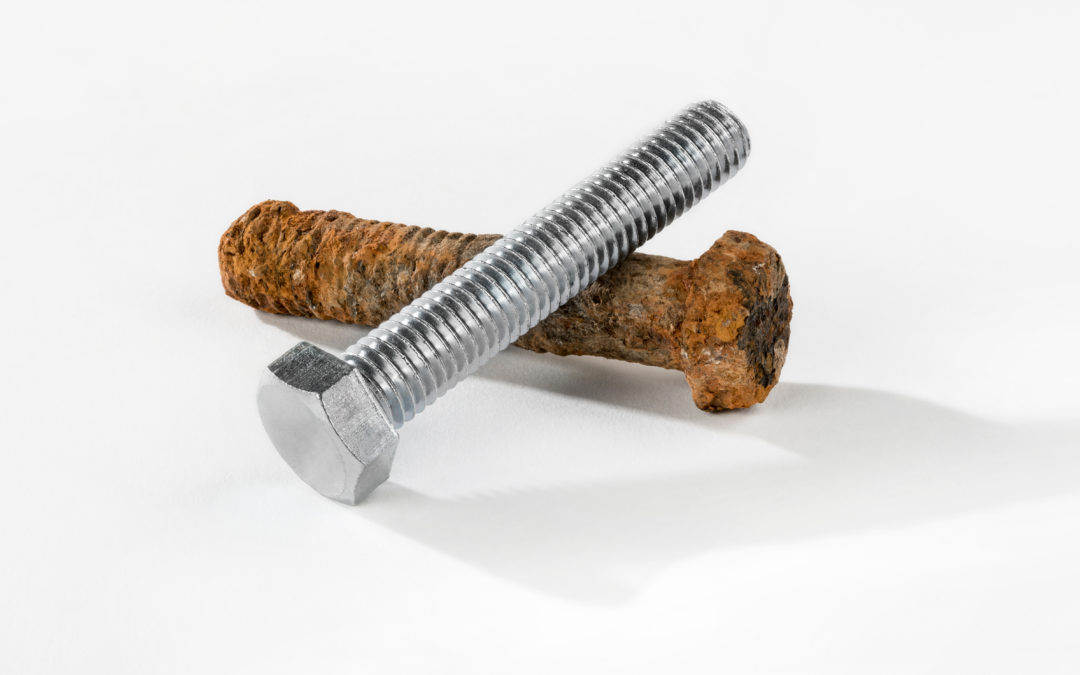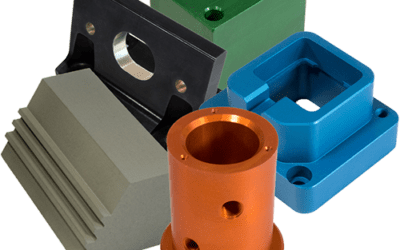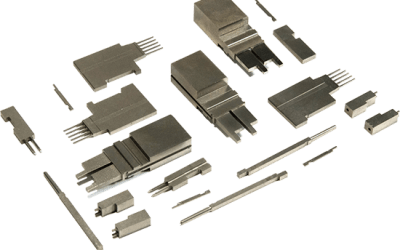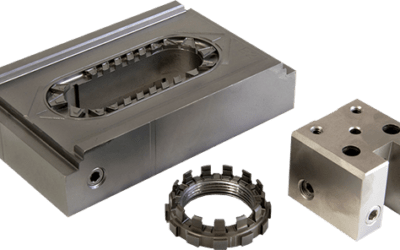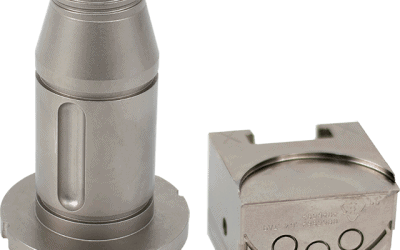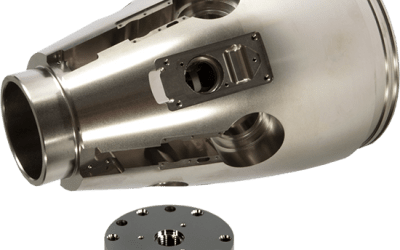Fastener Coatings to Prevent Thread Corrosion in Fasteners & Rust-Prone Applications
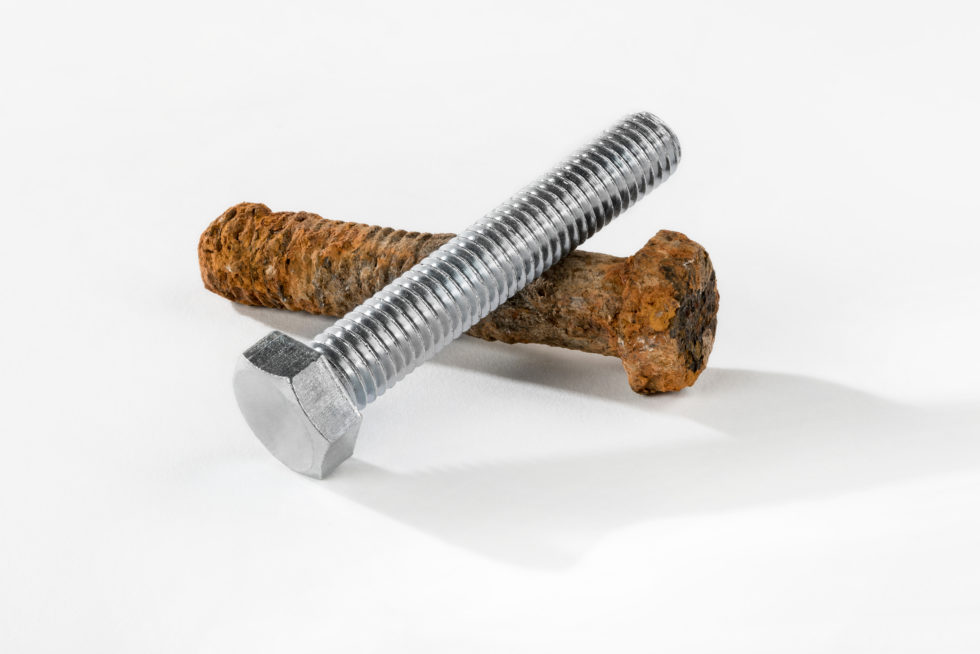
In modern society, fasteners are ubiquitous. The materials that create the structures of our cityscapes and rural communities alike are an integral part of modern life. The fasteners holding these materials together, while often taken for granted, are vital to the integrity of these structures. They must be dependable and safe, so thread corrosion in fasteners must be considered in structural design, construction and maintenance plans.
Thread corrosion in fasteners is one of the most prevalent issues causing fastener failure. Corrosion is a natural phenomenon which occurs under certain moisture, temperature and atmospheric conditions. It occurs everywhere, but coastal and offshore applications rust more easily due to their exposure to saltwater, atmospheric salinity as well as saltwater spray. Cleaning agents, high humidity and ‘dirty’ environments like sewage and mining, all exacerbate the corrosion process. Chemical process environments, rich in carbon dioxide, are also tough on metals. Thread corrosion in fasteners cannot be avoided, only mitigated.
Anti-corrosion fastener coatings can moderate thread corrosion in fasteners and thereby damage to equipment in industrial applications. Progress for Industry (PFI) offers several types of fastener coatings, such as electroless nickel plating and zinc coatings, that help mitigate thread corrosion in fasteners and other parts.
Types of Fastener Corrosion
There are two main categories of fastener corrosion, electrochemical corrosion and direct chemical attack, both hasten thread corrosion in fasteners.
Electrochemical corrosion takes place when two dissimilar metals are in contact with each other in the presence of an electrolyte, such as seawater, or the presence of atmospheric oxygen. There are several types of electrochemical corrosion, any of which can result in thread corrosion in fasteners.
- Galvanic corrosion – Two different metals are in contact, resulting in pitting or erosion damage.
- Stress corrosion cracking – Tensile stressed parts are in a corrosive environment, making them more susceptible to failure.
- Crevice corrosion – Dirt or moisture accumulates in crevices of an improperly ventilated fastener.
- Uniform corrosion – Occurs due to improper coating of a fastener, causing rust that makes the fastener difficult to replace.
- Pitting corrosion – Microscopic holes form on a fastener.
A direct chemical attack typically occurs in harsh environments such as in an aerospace application, a marine application, and the oil and gas industry. Thread corrosion in fasteners results when the material of which a fastener is made is soluble in the environment. In these cases, thread corrosion in fasteners can be mitigated by ensuring the fastener material is unaffected by potential solvents or by selecting fastener coatings that can withstand the solvents.
Threaded Component Corrosion Prevention
Applying appropriate anti-corrosive fastener coatings to threaded components helps deter thread corrosion in fasteners and ensures metal components extend their lifespans. Zinc is one of the most requested anti-corrosion fastener coatings. Zinc plating improves electrical properties, increases temperature resistance, and reduces abrasion and wear. Sometimes called sacrificial plating, zinc plating is typically less corrosion-resistant than the base metal and corrodes sacrificially to protect the fastener. Zinc plating, however, lacks uniformity which causes issues in precision applications.
Electroless nickel plating is an anti-corrosion fastener coating appropriate for precision threaded parts and screw parts. It eliminates galling of the threads during use as well as extends service life. PFI electroless nickel plating is created through a chemical reaction between the material being plated and the nickel solution. After the material is bathed, the electroless nickel will have bonded to the substrate. The plated material will not conduct any electricity as the solution seals the substrate from the outside environment, reducing thread corrosion in fasteners and other precision parts. Electroless nickel deposits uniformly no matter what material you are plating. This coating consistency helps maintain tight tolerances on threaded fasteners.
Finally, another anti-corrosion strategy is changing the material with which the fasteners are made. Rust-prone metals such as iron and steel can be swapped with less corrosive metals such as brass. This approach requires careful environmental and cost analysis to ensure that fasteners are constructed of appropriate material, deliver the desired amount of corrosion resistance, and does so in the most cost-effective manner for the preferred level of protection.
Fastener Coatings and Platings
There are several fastener coating options available in order to inhibit thread corrosion in fasteners.
- Zinc/Hot Dip Zinc (Galvanizing) – Galvanizing is the process of immersing iron or steel in a bath of molten zinc to produce a corrosion resistant, multi-layered coating of zinc-iron alloy and zinc metal. While the steel is immersed in the zinc, a metallurgical reaction occurs between the iron in the steel and the molten zinc.
- Electroless Nickel – The process of electroless nickel plating deposits an even layer of nickel-phosphorus alloy to the surface of the substrate resulting in a material with exceptional uniformity, critical to inhibiting thread corrosion in fasteners while ensuring precision. PFI’s electroless nickel plating offers superior corrosion protection with up to 1,000 hours of salt spray protection for parts up to .001” thickness.
- Anodizing – Hardcoat anodizing, type IIIis a fastener coating that transforms a plain metal surface into an exterior that provides corrosion-resistance and durability. The process provides the surface with greater wear resistance and a smoother, harder finish.
- Chrome Plating – Chrome plating is an ideal fastener coating for equipment exposed to caustic elements. Chrome mitigates the risk of rust and enforces the strength of the base material. Chrome also offers high lubricity to prolong the life of a machine by reducing friction. Less friction means smoother functioning with reduced risk of wear and overheating.
Unsure of What Fastener Coating to Use?
The most appropriate fastener coating for a particular application depends on several factors.
- Nature of the application
- Environmental factors
- Nature of the structural materials
- Stress exerted on the fasteners
The precise specifications must all be considered when determining the most effective method for inhibiting thread corrosion in fasteners. At times, the fastener coating consideration matrix can become complex.
Consulting with PFI on your fastener coating requirements ensures the application of the most effective solution. PFI coating services encompass a range of options, from zinc plating when economical fastener coating is a priority, to electroless nickel when it is critical to achieve high precision and uniformity of the fastener coating. PFI also offers anodizing and chrome plating fastener coatings when strength or friction-resistance is required.
Regardless of the application, PFI has a fastener coating that will help inhibit thread corrosion in fasteners and achieve the maximum life of fastener applications.
Contact PFI for a quote today.
